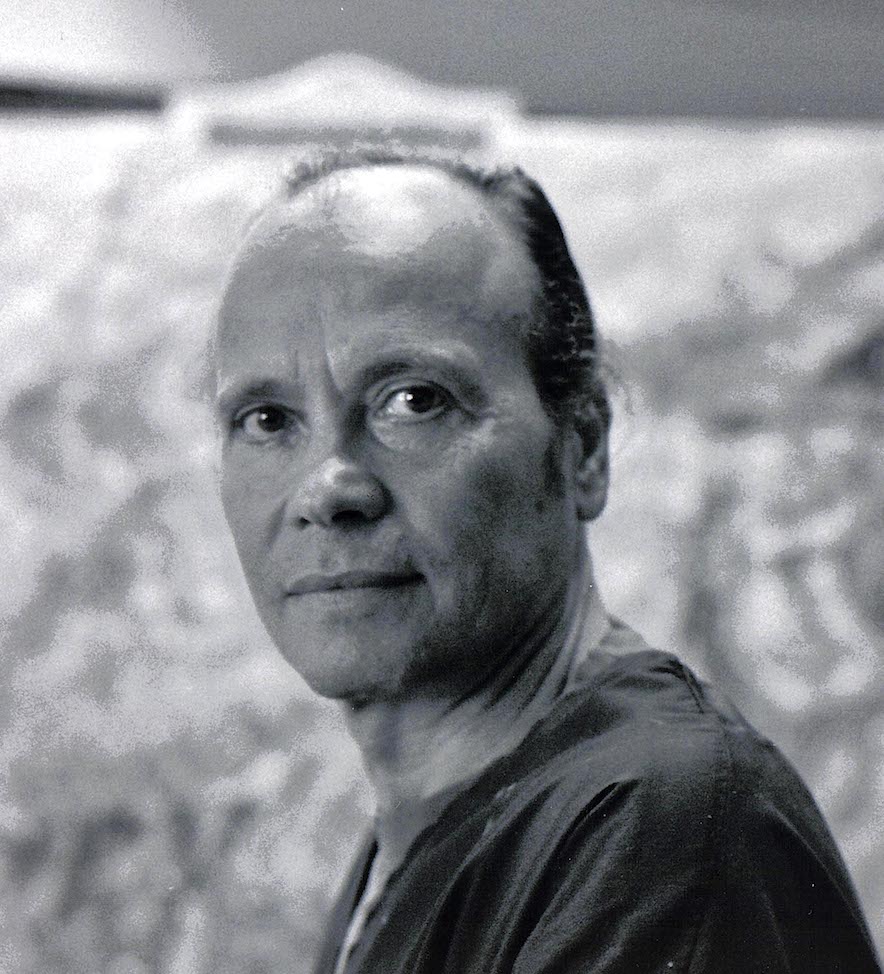A Narrative Chronology
“One of the foremost colorists working in America today, Sassone is an artist who developed his own personal, expressive vision early in his career, and who has steadfastly remained faithful to it while refining and developing it to the full power and maturity that is seen in his works today.”
— Janet Dominik, Bernheim-Jeune, Paris, 1988.
Marco Sassone was born in Campi Bisenzio, a Tuscan village, in 1942. The family moved to Florence in 1954, and there he met painters Ottone Rosai and Ugo Maturo, who encouraged him to follow his interest in art. In 1959 he enrolled at the Istituto Galileo Galilei, where he studied architectural drafting for several years. In 1963 he studied with painter Silvio Loffredo, a professor of art at the Accademia in Florence, himself a pupil of the Austrian master Oskar Kokoschka.
Loffredo encouraged him to develop his own style and vision. For inspiration, Sassone studied the works of the 19th century Italian impressionists, the Macchiaioli: Giovanni Fattori, Vito D’Ancona, and Silvestro Lega. He began exhibiting his first works at Lo Sprone Cultural Center in Florence.
In November 1967, soon after the flood had devastated his city, Sassone moved to California. He exhibited for the first time in the United States at the Dalzell-Hatfield Galleries in Los Angeles and became a regular exhibitor at the annual Festival of the Arts in Laguna Beach.
Throughout the seventies, he exhibited extensively in the U.S. and abroad. In 1976 he collaborated with director John Wilson to produce an autobiographical documentary. The following year his work was exhibited at the National Academy of Design in New York. Marco Sassone received a gold medal in 1978 from the Italian Academy of Arts, Literature and Science. In 1979 the monograph Sassone by art historian Donelson Hoopes was published in concurrence with the artist’s exhibition at the Laguna Art Museum. With prescience, Hoopes had observed: “Sassone’s art has evolved from within, and such an organic, psychological and spiritual process may take his work along new and unforeseen paths.”
In 1981 Sassone moved his studio to San Francisco. During the 1980s his exhibition schedule continued along with his numerous lectures. In 1982 Marco Sassone was knighted by the President of Italy, Sandro Pertini, into the “Order of the Merit of the Italian Republic.” In 1987 Sassone received a commendation from Los Angeles Mayor Tom Bradley for his “contribution to the community through his art.” In March 1988, the Los Angeles Municipal Art Gallery mounted his solo exhibition titled Sassone with the publication of a catalogue authored by Janet Dominik. The show traveled to Paris and was installed at the historic Bernheim-Jeune Gallery for the month of April.
By the late eighties, the artist had become increasingly concerned with social themes. He began extensive and personal research on the homeless and painted a series of large canvasses and charcoal drawings portraying the life he observed on the streets of San Francisco. A number of these works were exhibited at the Chicago International Art Exposition, the Basel Art Fair in Switzerland, Body Politic at the San Francisco Arts Commission Gallery and Issue of Choice at the Los Angeles Contemporary Exhibition (LACE).
In March of 1994, his exhibition “Home on the Streets” opened at the Museo ItaloAmericano in San Francisco. Kenneth Baker, art critic for the San Francisco Chronicle wrote about his work: “There is true technical brilliance here…In the drawings, his technique seems to discover fresh descriptive possibilities each time out.” The exhibition traveled to Los Angeles in 1996 and Florence, Italy in 1997, where it was installed in the Cloisters of the Santa Croce Church. Paola Bortolotti, art critic for La Nazione, wrote: “The persistent theme however does not carry a denunciation of a social problem, but it is rather the pretext to pour forth onto canvas the urgency of the brush strokes loaded with pigment and light.”
In 1997 Marco Sassone received a commission to create a 200 square foot mural in downtown San Francisco. The finished work comprised five canvases dedicated to the theme of Il Palio is presently in the permanent collection of Santa Clara University, Santa Clara, California.
In May, 2001, the Museo ItaloAmericano in San Francisco inaugurated the exhibition, “Master and Pupil,” with works by Oskar Kokoschka, Silvio Loffredo, Marco Sassone. Author Peter Selz, writing in the catalogue, described the link between the three artists: “A canvas like Chinese Reds (1990) in scarlet color relates to the chromatic scheme of his teacher’s Angel of Death (1998), while alarming paintings like Marlboro Country (1990) with its human skulls spread in the foreground, or Coit Tower Night (1988) – a painting of deep blue water, a brown hill and a violent purple sky – all done with an agitated brush, elicit a fervent emotion, comparable to the sensations evoked by the canvases of Kokoschka himself.” The Palazzo Ducale Museum in Massa-Carrara, Italy presented his retrospective exhibition in March-April, 2002 with the publication of a catalogue authored by Massimo Bertozzi. The exhibition was reviewed by La Nazione, Florence and La Repubblica, Rome. Ilaria Bonuccelli wrote for La Repubblica, “The man with blue eyes stares out at you. No concessions made. He offers you – perhaps forces upon you – a magnified view of trashed humanity. The kind that rummages around along the sidewalks of San Francisco. His pupils gape at an interior world which he invites you to enter, without knocking. The brush-strokes are merciless. ” Master and Pupil was installed in the Cloister of Sant’ Agostino Museum in Pietrasanta, Italy in 2003. Milly Mostardini wrote in a review for Il Tirreno: “From Kokoschka to Loffredo and Sassone: The lessons are passed on from master and pupil. Sassone’s expressionism leads to visionary transformations, in an intense dance of chromatic impastos, with furious, explosive strokes of pigment.”
In 2005 Marco Sassone relocated his studio to Toronto, Canada and immediately forged a rapport with the city.
In 2008 his exhibition Marco Sassone: Toronto opened on April 3 at Odon Wagner Contemporary. Jonathan Goodman, art critic for Art in America, wrote in the exhibition catalogue, “Sassone’s audience approaches his work knowing that the paintings are in dialogue with a tradition going back to the early twentieth century. His expressionism escapes the epithet of anachronistic, however, by being so sharply lived. While his works are not overly emotional, they gain success because they relate to a complete life of the imagination in which feelings and intellect combine. ” Deirdre Kelly wrote in the Globe and Mail: “With gestural brush strokes and an expressionistic use of color, Sassone romanticizes such banal views as a Carlaw parking lot and the westbound Gardiner Expressway.” In that same year, 2008, Marco Sassone received a commission to create a mural for the lobby of the Bellagio, a glass tower in downtown Toronto. The artist prepared drawings and a final study in pastel, in scale for the space. The completed work, comprised of three panels and titled Waterfront, was installed in late October. In the following years Sassone participated at the International Art Fair, Palm Beach 3 in Florida and in the Group exhibition Summerset at David Findlay Jr. Fine Art, New York. The artist lectured at Seaton House, the largest homeless shelter in Toronto.
In 2010 Sassone returned to San Francisco to attend the October 1st inauguration of his one man show installed in the splendid space of the Shrine of Saint Francis. He traveled to Rome for his exhibition Santuario at the Palazzo dell’Informazione. The Adnkronos news agency produced a video-interview titled Marco Sassone – Quando l’Anima Resta Inchiodata alla Tela. (Marco Sassone – When the Soul is Nailed to the Canvas.)
In 2012 the exhibition Marco Sassone: Watercolours opened at Berenson Fine Art, Toronto. Peter Clothier wrote in the Huffington Post: “These dark paintings are, after all, not primarily about the darkness that pervades them, but about the light that manages to shine through.” In October he attended the opening of his exhibition Architecture and Nature installed at the Price Tower Art Center, a museum designed by Frank Lloyd Wright in Bartlesville, Oklahoma.
Sassone’s profound interest in the urban landscape resulted in a series of large canvases and watercolors that were exhibited at the San Angelo Museum of Fine Art, San Angelo, Texas in 2014. The same year he received an invitation for a site-specific installation based on the artist`s attraction to fashion and footwear. His exhibition titled Marco Sassone: His Boots and Other Works opened on June 9, 2016 at Bata Shoe Museum in Toronto. Deirdre Kelly noted in her essay for the exhibition catalogue:
His paintings of footwear dance with meaning. They are the product of an artist wanting to understand his world by stepping into other people`s shoes and deepen his understanding of self by painting what remains special to him…Sassone heightens their physical beauty with impasto and other tactile painting techniques that elevate the footwear to the status of fine art.
In 2017 his exhibition Viaticus was presented at Berenson, his dealer in Toronto. Central to this show were the artist`s watercolor studies, an integral part of Sassone`s oeuvre; in the intimate scale of these watercolors, the sequence of narrative evoked the spiritual journey that informed the broad-ranging surface of his canvases, permeated by a palpable sense of motion. Viaticus — a Latin term for all that pertains to the road — identifies the artist’s journey in its multiple discoveries and experiences.
The following year, the Columbus Centre in Toronto announced the Canadian premier of his landmark exhibition Home on the Streets that was installed in both the Upper and Lower galleries from January 24 to May 21, 2019. This show — which previously had traveled to San Francisco, Los Angeles and Florence, Italy — included selected additional work executed over the past 25 years. Peter Clothier, the author of the exhibition catalogue stated:
The raw edge of these pictures is not their public rhetoric but their private agony… Homelessness, for this exiled artist whose roots are still not firmly planted in American soil is not eventually a social problem but a personal and deeply-felt emotional experience.
What does it take to be ensconced in the “Pantheon of American Art”?
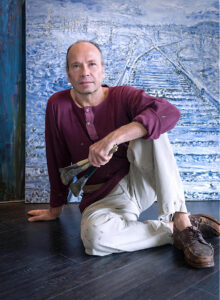
I never told Marco Sassone this story. But with the recent release of his autobiography, American Journey — My Life in Art, it’s about time I did. It’s about his relationship with the late great art historian and impresario Peter Selz [1919–2019]. When he was Chief Curator at MoMA, he mounted seminal exhibitions, from Rodin to Rothko. Then he went on to serve as the founding director of the Berkeley Art Museum. My long drives with Peter were always illuminating. He had that uncanny ability in his conversations to maintain a great sense of humor while pulling no punches about the denizens who inhabited the art world. He knew all of them — art dealers, critics, museum curators, art historians, and especially artists. On one of those long trips, we drove northwest from Berkeley through the rugged forests, winding our way until we arrived at a small graveyard hidden in the forest near the northern coast. Selz wanted to visit the gravesite of his good friend Sam Francis. He also wanted to check on the condition of his own headstone next to it. Little wonder that on our return trip he was in a deeply reflective mood, talking about artists he knew well. Like me, he was frustrated for those artists who, he felt, never received the broader critical recognition they deserved — approval required for being ensconced in that proverbial cultural institution the art market calls the “Pantheon of American Art.” That’s when he brought up the name of Marco Sassone. Turned out both of us knew him well. Selz declared, in his calm and authoritative gravelly German accent, that Sassone was one of those few artists who impressed him deeply as “the real deal” in terms of the quality of his painting as well as the authenticity of his spirit as an artist.
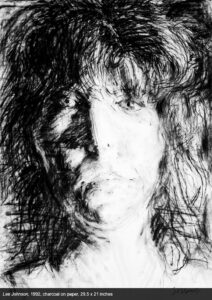 Peter Selz would have loved Sassone’s autobiography, which unfolds as a vivid, transformational journey. Sassone’s foundation in art began in the 1960s, studying under a master in his native Florence, Italy. In the 1970s, in California, he found success with the maturation of his alluring post-impressionistic style, executed with a mastery of color and bravura brushwork in heavy impasto. He found some fame, too. He dined with Sophia Loren, conversed with Luciano Pavarotti, and joked with Tina Turner at a Beverly Hills opening of his paintings. His final reflections include a lawsuit he won recently in the Nevada Supreme Court over the forgery of his artworks. But what really makes this memoir extraordinary is his revelation that sales never brought a real sense of fulfillment.
Peter Selz would have loved Sassone’s autobiography, which unfolds as a vivid, transformational journey. Sassone’s foundation in art began in the 1960s, studying under a master in his native Florence, Italy. In the 1970s, in California, he found success with the maturation of his alluring post-impressionistic style, executed with a mastery of color and bravura brushwork in heavy impasto. He found some fame, too. He dined with Sophia Loren, conversed with Luciano Pavarotti, and joked with Tina Turner at a Beverly Hills opening of his paintings. His final reflections include a lawsuit he won recently in the Nevada Supreme Court over the forgery of his artworks. But what really makes this memoir extraordinary is his revelation that sales never brought a real sense of fulfillment.
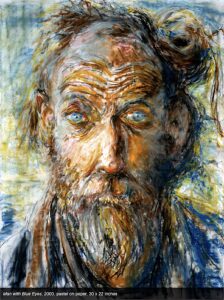 Instead, Sassone went through a painful soul-searching process, examining if there was a bigger objective to painting in the first place. Why does art matter? In the late 1980s, that quest brought him to the back streets of San Francisco where he experienced a deep empathy for the homeless. Sassone was no passive observer. He instead spent hours revisiting characters like “Willie” (left) whose piercing blue eyes and grizzled visage express deep psychological insights. A series of these striking portraits formed the groundbreaking exhibition, Home on the Streets. Peter Selz wrote, “Homelessness, a condition which we have come to know too well in American cities, does not exist in European cities, except in wartime. The Italian painter, therefore, was astounded with what he encountered in San Francisco.
Instead, Sassone went through a painful soul-searching process, examining if there was a bigger objective to painting in the first place. Why does art matter? In the late 1980s, that quest brought him to the back streets of San Francisco where he experienced a deep empathy for the homeless. Sassone was no passive observer. He instead spent hours revisiting characters like “Willie” (left) whose piercing blue eyes and grizzled visage express deep psychological insights. A series of these striking portraits formed the groundbreaking exhibition, Home on the Streets. Peter Selz wrote, “Homelessness, a condition which we have come to know too well in American cities, does not exist in European cities, except in wartime. The Italian painter, therefore, was astounded with what he encountered in San Francisco. 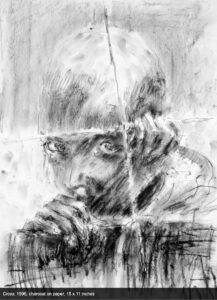 He found the homeless a compelling subject for very powerful paintings, in which a fascinating effect is achieved by the contrast of the misery of the motif and the eloquence of the vigorous brushwork.” Ever since, Sassone’s paintings have lived up to Selz’s praise as passionately orchestrated themes of humanism. The artist’s unwavering belief in his own vision shines throughout this book. Ultimately, we are reminded that true innovation in painting only achieves authenticity when the conceptual approach has as its catalyst an intimate inner vision. That’s when the final artwork can elevate the quality of our lives.
He found the homeless a compelling subject for very powerful paintings, in which a fascinating effect is achieved by the contrast of the misery of the motif and the eloquence of the vigorous brushwork.” Ever since, Sassone’s paintings have lived up to Selz’s praise as passionately orchestrated themes of humanism. The artist’s unwavering belief in his own vision shines throughout this book. Ultimately, we are reminded that true innovation in painting only achieves authenticity when the conceptual approach has as its catalyst an intimate inner vision. That’s when the final artwork can elevate the quality of our lives.
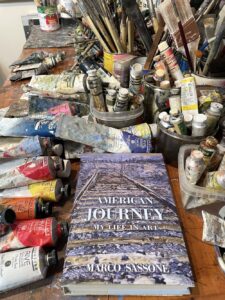
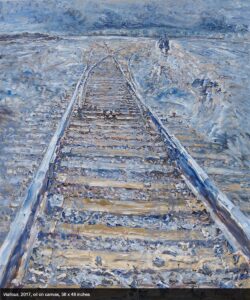 Our Mission:
Our Mission:
Connect artist estate collections with galleries and museums
We don’t sell art.
Our affinity galleries do that.
We focus on research, writing, curating, and publishing. Then reaching out to gallery owners and museum curators.
Art Dealers and Curators:
Let’s work together to present more discoveries that matter.
-
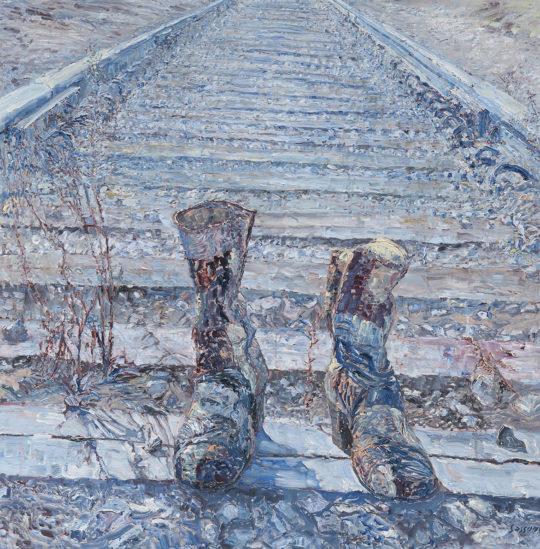 DETAILS
DETAILSBlue Track, 2019
48 x 48 inches (121.92 x 121.92 cm) -
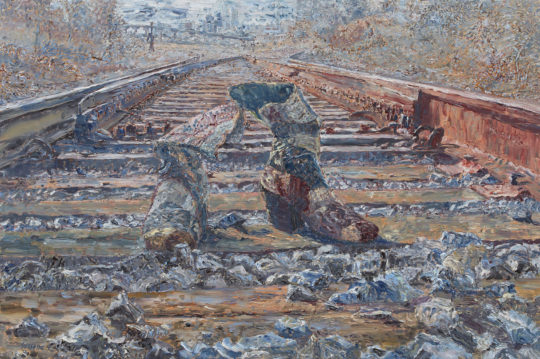 DETAILS
DETAILSJourney
48 x 72 inches (121.92 x 182.88 cm) -
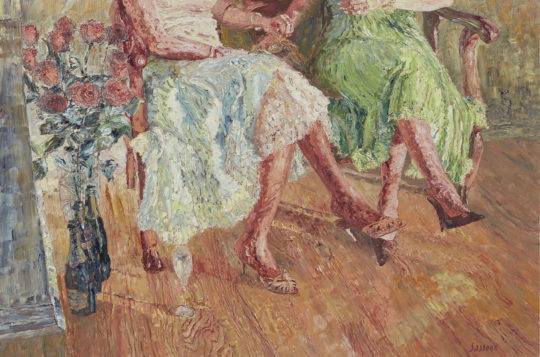 Out of stock DETAILS
Out of stock DETAILSMirella and Emilia
48 x 72 inches (121.92 x 182.88 cm) -
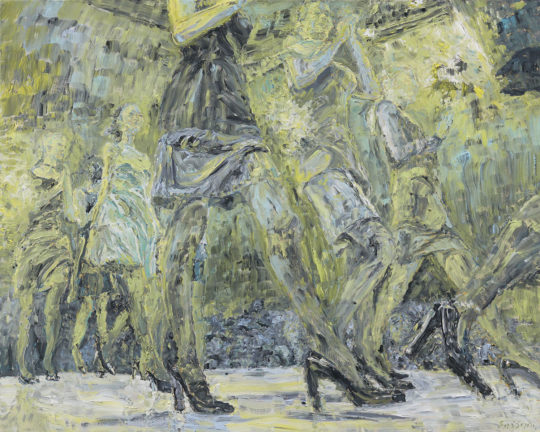 DETAILS
DETAILSRunway
48 x 60 inches (121.92 x 152.4 cm) -
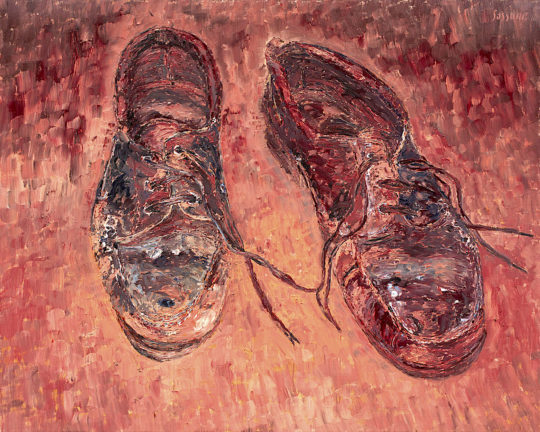 DETAILS
DETAILSSelf-Portrait
48 x 60 inches (121.92 x 152.4 cm) -
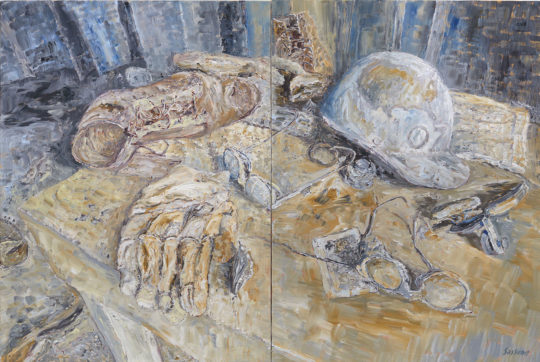 DETAILS
DETAILSShutdown
48 x 72 inches (121.92 x 182.88 cm) -
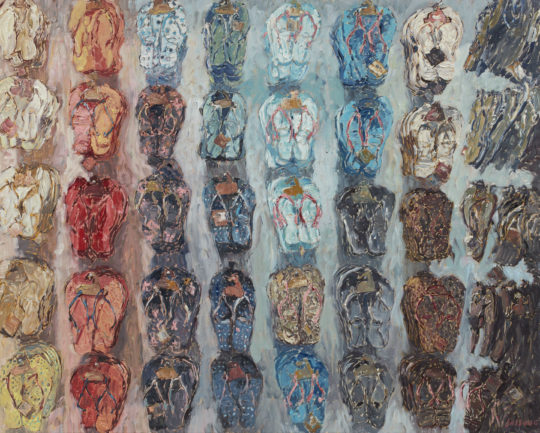 DETAILS
DETAILSThongSandals
48 x 60 inches (121.92 x 152.4 cm) -
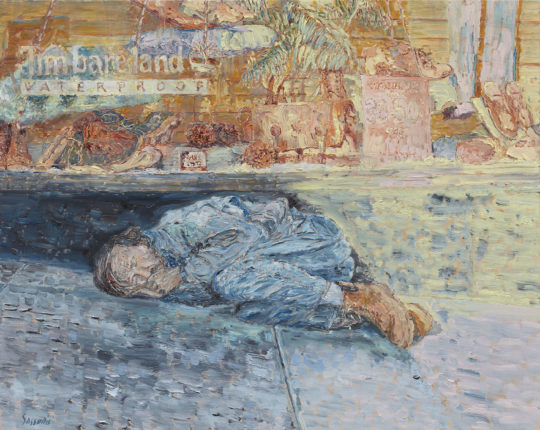 DETAILS
DETAILSTim Bare Land
48 x 60 inches (121.92 x 152.4 cm) -
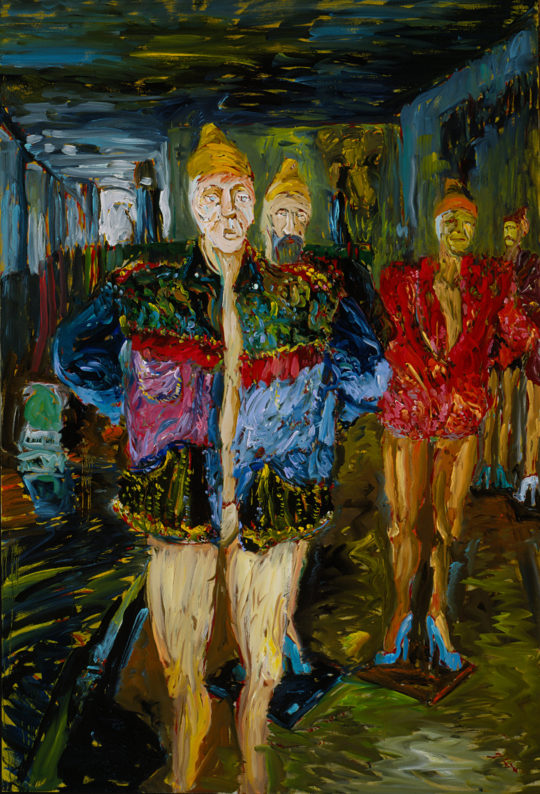 DETAILS
DETAILSWe Are Mannequins
90 x 60 inches (228.6 x 152.4 cm)
